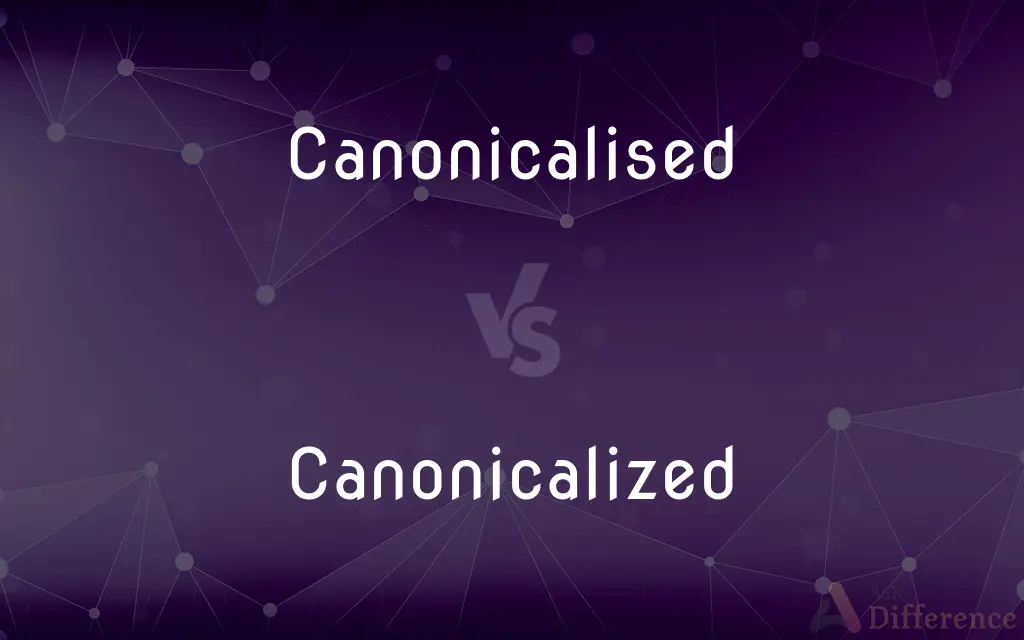Canonicalised vs. Canonicalized — What's the Difference?
By Fiza Rafique & Urooj Arif — Updated on May 8, 2024
"Canonicalised" is the British English spelling, while "canonicalized" is the American English version. Both mean making something conform to an accepted standard.

Difference Between Canonicalised and Canonicalized
Table of Contents
ADVERTISEMENT
Key Differences
"Canonicalised" is used primarily in British English to describe aligning something to a recognized standard. "Canonicalized," on the other hand, is the American English equivalent and carries the same meaning but with a different spelling.
"Canonicalised" is consistent with other British English spellings that use "s" instead of "z." Conversely, "canonicalized" follows the American English convention of using "z" in words like "realize" or "organize."
Both forms apply to the concept of standardizing data or content, particularly in computer science and linguistics. "Canonicalised" may be seen more in British publications, whereas "canonicalized" is common in American tech documentation.
Despite spelling differences, both terms are fully understood in global contexts due to the commonality of technical jargon. "Canonicalised" might seem unusual to an American audience, while "canonicalized" could appear foreign to some British readers.
The spelling variation extends beyond these specific words to other verb forms. "Canonicalised" becomes "canonicalising" in British English, while "canonicalized" changes to "canonicalizing" in American English.
ADVERTISEMENT
Comparison Chart
Usage
British English
American English
Spelling Pattern
Uses "s" in the suffix
Uses "z" in the suffix
Frequency
Common in British technical writing
Common in American technical writing
Associated Forms
Canonicalising (British gerund form)
Canonicalizing (American gerund form)
Examples
"Data is being canonicalised."
"The data was canonicalized."
Compare with Definitions
Canonicalised
Adjusted to remove redundancy or ambiguity.
The software settings were canonicalised for clarity.
Canonicalized
Adjusted for consistency and simplicity.
The database entries were canonicalized before analysis.
Canonicalised
Converted into a simpler and more manageable version.
Text data was canonicalised for easier processing.
Canonicalized
Adapted to a standard recognized format.
Files were canonicalized to improve software compatibility.
Canonicalised
Aligned with a canonical form or structure.
Linguistic forms were canonicalised for the dictionary.
Canonicalized
Made to conform to a canonical rule or structure.
Web pages were canonicalized to enhance search engine rankings.
Canonicalised
Made consistent with an accepted specification.
The API data was canonicalised before integration.
Canonicalized
Converted into an authoritative or widely accepted format.
Email addresses were canonicalized during validation.
Canonicalised
Standardized according to a recognized rule.
The web page URLs were canonicalised to prevent duplication.
Canonicalized
Normalized to remove ambiguity or repetition.
The data was canonicalized to streamline processing.
Canonicalised
Simple past tense and past participle of canonicalise
Canonicalized
Simple past tense and past participle of canonicalize
Common Curiosities
What's the difference between "canonicalised" and "canonicalized"?
"Canonicalised" is the British English spelling, while "canonicalized" is the American English form. Both mean standardizing something.
Where would I commonly find "canonicalised"?
You would typically find "canonicalised" in British English literature or technical writing.
Is there a practical difference in how "canonicalised" or "canonicalized" are used in programming?
No, there is no practical difference in programming; both terms refer to the same process of standardizing data or structures.
Is one form more correct than the other?
Neither form is more correct. The difference is primarily regional.
Do these terms refer only to computer science?
No, they can apply to any field where standardization or normalization is required.
Is there a noun form for "canonicalised" and "canonicalized"?
Yes, the noun form is "canonization," which means the process of making something standard or accepted.
Why does British English prefer "canonicalised" while American English uses "canonicalized"?
British English generally favors "s" in many verbs like "organise" and "realise," while American English replaces "s" with "z," resulting in differences like "organize" and "realize."
Can I use either "canonicalised" or "canonicalized" interchangeably?
Yes, you can use either form interchangeably, but it's best to match the spelling with the intended audience's regional preference.
Are there regional preferences for other similar technical terms?
Yes, terms like "optimised" vs. "optimized" or "minimised" vs. "minimized" follow similar patterns between British and American English.
Do "canonicalised" and "canonicalized" have the same etymology?
Yes, both words derive from "canon," meaning a rule or standard, and have the same historical root despite regional spelling differences.
Do "canonicalised" and "canonicalized" apply specifically to web development?
Although common in web development (like canonical URLs), these terms can apply to standardization in other technical areas such as linguistics, databases, and software design.
Do search engines recognize both "canonicalised" and "canonicalized"?
Yes, search engines can interpret and process both spellings, particularly for technical content like canonical URLs.
Are there professional style guides that recommend one spelling over the other?
Yes, style guides often recommend using "canonicalised" for British English and "canonicalized" for American English to maintain consistency with regional spelling norms.
How can I ensure my work uses the appropriate spelling between "canonicalised" and "canonicalized"?
Review the audience and guidelines for your writing. If writing for a global audience, it's useful to explain the context and meaning regardless of the specific spelling used.
Is "canonicalised" used outside of British English-speaking regions?
"Canonicalised" is recognized outside the UK, particularly in countries following British English conventions, like Australia and New Zealand.
Share Your Discovery

Previous Comparison
Eating vs. Dining
Next Comparison
Singing vs. RappingAuthor Spotlight
Written by
Fiza RafiqueFiza Rafique is a skilled content writer at AskDifference.com, where she meticulously refines and enhances written pieces. Drawing from her vast editorial expertise, Fiza ensures clarity, accuracy, and precision in every article. Passionate about language, she continually seeks to elevate the quality of content for readers worldwide.
Co-written by
Urooj ArifUrooj is a skilled content writer at Ask Difference, known for her exceptional ability to simplify complex topics into engaging and informative content. With a passion for research and a flair for clear, concise writing, she consistently delivers articles that resonate with our diverse audience.
















































